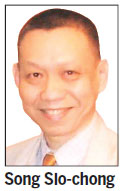So-called referendum deceptive and dangerous
Updated: 2014-06-23 07:32
By Song Sio-chong(HK Edition)
|
|||||||
The "Occupy Central" campaign supporters have asked the Hong Kong public to select from three proposals, all including element of civil nomination, for the 2017 Chief Executive election since Friday. This is a deceptive tactic - undemocratically decided upon - by the civil disobedience movement. They also plan to lead a massive occupation of Central and paralyze the financial heart of our city. The organizers believe this will make the central government bend to local pressure.
They must be dreaming if they think the central government, who has made the "One Country Two Systems" policy such a success, will give in to an unlawful movement. Clearly "One Country, Two Systems" and the arrangements for universal suffrage outlined in the Basic Law are legitimate and justified. So any movement opposing them has to be illegitimate and unjustified.
More people now believe the movement is acting in a contemptible and ruthless way by attempting to seduce an uninformed public - particularly young people. But whatever its organizers say the campaign will result in significant economic damage to Hong Kong. It may possibly lead to serious social unrest - even acts of terrorism.
One aspect of the movement is a referendum conducted by so-called electronic voting. But this has no legal basis in Hong Kong and, in fact, contravenes the Basic Law.

Article 12 of the Basic Law clearly states Hong Kong is a local administrative region which comes directly under the central government. This means that the People's Republic of China is a unitary country where no region has individual sovereignty. The exercise of such a referendum is an expression of such sovereignty. It is interesting to note that in the French constitution - and France is also a unitary country - local regions are prohibited from expressing sovereignty through referendums.
The content of the so-called referendum is also problematic. According to Article 45(2) of the Basic Law, the nomination of the Chief Executive candidates is the responsibility of the Nominating Committee. Other than the Nominating Committee there is no nomination body or system allowed to undertake this function. This, therefore, rules out civil nomination.
Article 11(1) of the Basic Law also stipulates that electoral systems practiced in Hong Kong must be based on the all the provisions of this law. So civil nomination clearly violates the Basic Law.
It should also be noted that a referendum will have no legal impact or significance in Hong Kong. It appears to me that it is seditious to mislead the public to believe that civil nomination is a viable option - particularly if a lot of people participate in the unconstitutional referendum.
Some slogans from the "referendum" are also seditious. One of these was reproduced in the covering page of Next Magazine. The magazine makes no attempt to conceal that the purpose of the referendum is "Voting against the Communists". This breaches the very essence of the "One Country, Two Systems" principle. The late paramount leader Deng Xiaoping clearly explained to drafters of the Basic Law on April 16, 1987 that Hong Kong must never become a place for subversive activities against the mainland's political system.
A recent special edition of Eastweek reported that Jimmy Lai, owner of Next Media and the Apple Daily, had met Paul Wolfowitz, former US deputy secretary of defense in George W. Bush's administration. The pair talked on Lai's private yacht for five hours on May 27. It is rather peculiar that a Hong Kong businessman is a friend of a former US official who was one of the architects of the wars in Iraq and Afghanistan.
Eastweek also alleges that the National Endowment for Democracy, controlled by CIA, has been offering funds to organizations in Hong Kong. It is very disturbing that Wolfowitz - a strong believer in containing the rise of China - should be in Hong Kong discussing the "referendum" and the "Occupy Central" campaign.
This clearly demonstrates that the Office of the Commissioner of the Ministry of Foreign Affairs is more than justified in saying it opposes foreign forces interfering in Hong Kong's affairs.
Hong Kong is poised to enter a period of social and economic turmoil because of the "Occupy" campaign. So it is very important we support the central government and SAR government in taking a firmer stand against the people and groups planning to cause unrest in Hong Kong.
The author is a HK veteran commentator and professor at the Research Center of Hong Kong and Macao Basic Law, Shenzhen University.
(HK Edition 06/23/2014 page9)